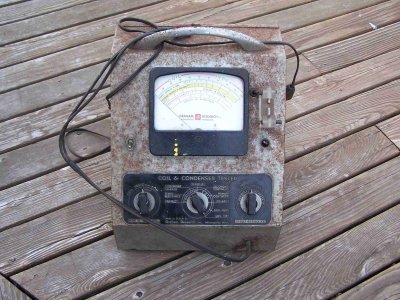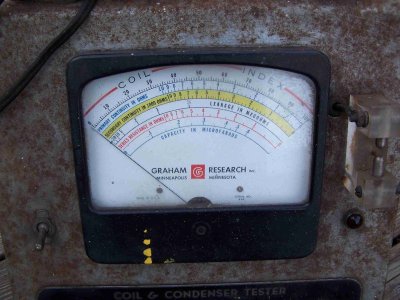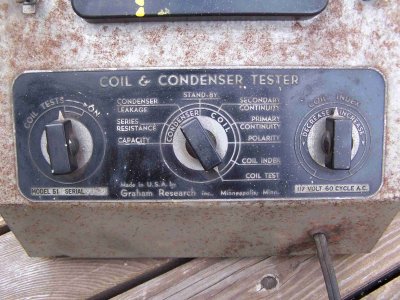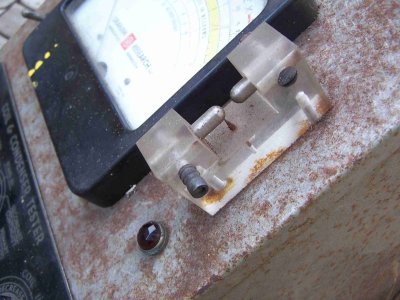A local guy we know dropped off this Graham Research Model 51 Coil and Condenser tester. Said he doesn't need it any more and thought with all of our old equipment around that we might want it. I've never run one of these, so I guess I need some schoolin'. GB should like it since its made in Minnesota.
You are using an out of date browser. It may not display this or other websites correctly.
You should upgrade or use an alternative browser.
You should upgrade or use an alternative browser.
New to Us coil tester
- Thread starter cjet69
- Start date
If you need a manual this link should help you
https://wrcoutboards.org/wp-content/uploads/2020/03/GrahamLee_Model_51_Users_Manual_r.pdf
https://wrcoutboards.org/wp-content/uploads/2020/03/GrahamLee_Model_51_Users_Manual_r.pdf
Thanks, 29Chev. Looks like a lot of good info .If you need a manual this link should help you
https://wrcoutboards.org/wp-content/uploads/2020/03/GrahamLee_Model_51_Users_Manual_r.pdf
Is this something more than a good multimeter could do ?Thanks, 29Chev. Looks like a lot of good info .
While the question was directed towards member cjet69 I hope that you won't mind me adding some information about the ignition and coil testers. While I am more familiar with the Merc-O-Tronic units I believe the Graham testers worked similarly and yes they would perform tests that a good multimeter cannot do. The testers can actually fire the ignition coil in a points and condenser ignition set up out of circuit and display the spark being produced in a spark window so you can visually see it. You can also observe how much current it takes to make the coil produce a spark at the spark gap and compare it to a chart to determine if the current draw is in spec or high. They will also measure resistance down to 0.1 ohms or better which a lot of "good" multimeters may or may not be able to do accurately. The testers will also test a condenser under true ignition generated voltage levels (which can range up to 300+ volts for brief periods of time in the primary circuit) something a good multimeter usually cannot do since it relies on the internal battery voltage of the meter to measure the capacitance value of a condenser. A capacitor may measure the correct value at a lower voltage but break down and partially short out when exposed to 300 volts in which case a good multimeter may show a capacitor as ok when in reality it is bad and creating a misfire or making the engine perform poorly. These are just a few of the many things that the ignition coil / condenser tester can do accurately that cannot be done using a good multimeter.Is this something more than a good multimeter could do ?
Great info, 29Chev. I need to read through the PDF manual and grab some coils we have laying around the shop. Some are good most are bad so I will see if I can figure out which is which with the tester.While the question was directed towards member cjet69 I hope that you won't mind me adding some information about the ignition and coil testers. While I am more familiar with the Merc-O-Tronic units I believe the Graham testers worked similarly and yes they would perform tests that a good multimeter cannot do. The testers can actually fire the ignition coil in a points and condenser ignition set up out of circuit and display the spark being produced in a spark window so you can visually see it. You can also observe how much current it takes to make the coil produce a spark at the spark gap and compare it to a chart to determine if the current draw is in spec or high. They will also measure resistance down to 0.1 ohms or better which a lot of "good" multimeters may or may not be able to do accurately. The testers will also test a condenser under true ignition generated voltage levels (which can range up to 300+ volts for brief periods of time in the primary circuit) something a good multimeter usually cannot do since it relies on the internal battery voltage of the meter to measure the capacitance value of a condenser. A capacitor may measure the correct value at a lower voltage but break down and partially short out when exposed to 300 volts in which case a good multimeter may show a capacitor as ok when in reality it is bad and creating a misfire or making the engine perform poorly. These are just a few of the many things that the ignition coil / condenser tester can do accurately that cannot be done using a good multimeter.
Thanks Stew. Honestly didn't know what they were able to do. Sounds like a very interesting piece .While the question was directed towards member cjet69 I hope that you won't mind me adding some information about the ignition and coil testers. While I am more familiar with the Merc-O-Tronic units I believe the Graham testers worked similarly and yes they would perform tests that a good multimeter cannot do. The testers can actually fire the ignition coil in a points and condenser ignition set up out of circuit and display the spark being produced in a spark window so you can visually see it. You can also observe how much current it takes to make the coil produce a spark at the spark gap and compare it to a chart to determine if the current draw is in spec or high. They will also measure resistance down to 0.1 ohms or better which a lot of "good" multimeters may or may not be able to do accurately. The testers will also test a condenser under true ignition generated voltage levels (which can range up to 300+ volts for brief periods of time in the primary circuit) something a good multimeter usually cannot do since it relies on the internal battery voltage of the meter to measure the capacitance value of a condenser. A capacitor may measure the correct value at a lower voltage but break down and partially short out when exposed to 300 volts in which case a good multimeter may show a capacitor as ok when in reality it is bad and creating a misfire or making the engine perform poorly. These are just a few of the many things that the ignition coil / condenser tester can do accurately that cannot be done using a good multimeter.





